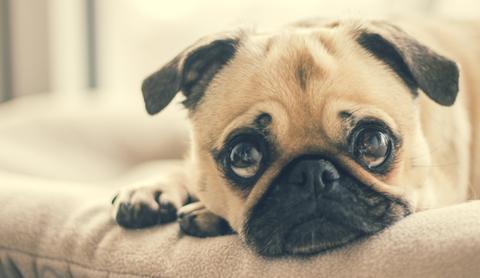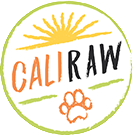Your Cart is Empty
8 Ways to Prevent Cancer in Dogs
April 30, 2019 6 min read
Preventing Cancer In Dogs
Cancer is the leading cause of death in adult dogs. In many cases, cancer is preventable through changes to the dog’s lifestyle, diet, and exposure to toxins. As prevention is always better than cure, the best thing you can do is start taking measures now to reduce the risk that your dog will ever suffer from cancer.
1. Avoid Kibble Containing Carcinogens
Diet is a major contributor to cancer. It is widely known that a poor diet increases the risk of cancer in humans; the same is true for dogs.
You may think that feeding your dog kibble is safe — surely there are no carcinogens in kibble, especially if you pick a high-quality product? In reality, many kibbles (including premium brands) contain ingredients that are carcinogenic.
The most common type of carcinogens are aflatoxins, a type of mold. This mold is particularly likely to grow on grains that are stored improperly. The problem with this kind of mold is that it remains even when food is cooked to a high temperature.
The solution is to provide your dog with fewer grains but more muscle and organ meat, bones, fruits, and vegetables. Just make sure that you choose organic foods, like raw dog food. Otherwise, you could be exposing your dog to cancer-causing pesticides.
For more information: Why Is Kibble Bad For Dogs?

2. Give Your Dog More Vitamin D
Even if your fuzzy friend spends many hours outdoors, there is no guarantee that he is receiving enough vitamin D. This is because, unlike humans, dogs can only receive a minimal amount of vitamin D from the sun. Therefore, they need to gain it from their diet.
Dogs require both types of vitamin D to stay healthy — vitamin D2 (which comes mostly from plants) and vitamin D3 (found mostly in fatty meats). The two types of vitamins help your dog absorb minerals like calcium and phosphorous, which are essential for many bodily functions.
When dogs lack vitamin D, they may lose their protection from cancer. In fact, studies have found that low levels of vitamin D in dogs are linked to an increased risk of cancer.
You can resolve this by providing your dog with more dietary vitamin D. The good news is that the vitamin is present in many foods, including liver, fish (especially cod and salmon), eggs, beef, and dairy. It is equally important, however, that you avoid giving your dog too much vitamin D, as it is possible for him to overdose on this fat-soluble vitamin.
A raw diet can provide your dog with the nutrients that kibbles fails to provide, such as vitamin D.
3. Avoid Excessive Sun Exposure
In contrast to the importance of Vitamin D, it's also important to prevent long-term exposure to the sun. The sun emits 3 kinds of UV rays with varying energies- UVA, possessing the lowest energy; UVB, which is more energetic and deeper penetrating than UVA; and UVC rays, which are luckily absorbed by our ozone layer.
The main culprit of skin cancer are UVA and UVB rays, both being able to cause different kinds of harm. When we and our dogs are exposed to the sun for a prolonged period of time, both of these rays are able to penetrate our skin and cause damage to our bodies.
Protecting your pup with dog-friendly sunscreen, staying indoors during the hottest times of the day, and investing in sun-protecting hats are all effective countermeasures to sun radiation.
4. Reduce Your Use of Flea Products
It is necessary to keep your dog free from fleas and ticks — both for their sake and yours. Even if your dog doesn’t suffer from a flea allergy, these parasites are bad for their health.
Fleas cause irritation, which makes even a healthy pet scratch their skin. In turn, this leads to scabs that can become infected. If your dog happens to ingest a flea, they could suffer from an internal infection caused by a tapeworm.
These two issues make it necessary to treat your dog for fleas. However, it is important to reduce your usage of flea products. No matter if it is natural or chemical, a commercial product can be carcinogenic.
The first thing to do is to switch to a safer product. The best option is to make your own flea and tick repellent at home.
Your second course of action should be to only use the treatment when necessary. Instead of applying the treatment on a periodic basis, wait until the dog actually shows signs of having fleas. Make sure you also check him regularly for ticks.
5. Incorporate Fruits & Vegetables in Their Meals
Fruits and vegetables pack a punch of vitamins ad nutrients, doing wonders in keeping your pup's body healthy. When they lack their essential nutrients, our dogs are unable to defend themselves from cancer-causing substances and free radicals, which we'll discuss shortly.
Fruits and vegetables are low-calorie, delicious, and packed with antioxidants, opening up several opportunities for your pup to avoid cancer. Obesity is a large cause of pancreas, kidney, and reproductive cancers. Feeding your dog low-calorie treats, like dog-friendly fruits and veggies, will be extremely helpful.
Before you feed your dog your favorite vegetable, make sure that it's safe for dogs first. Some foods that are great for us humans, like grapes, can be a dangerous snack for dogs.
6. Switch to Pet-Friendly Cleaning Products
Cleaning products, from detergent to floor cleaners, can all contain carcinogens. Just because you are picking non-toxic or green cleaners doesn’t mean that they are safe. If you read the list of ingredients, you will see that these items contain dangerous chemicals.
The good news is that it is easy to stop using all of these products in your home and replace them with pet-friendly alternatives. For example, you can kill most types of mold and bacteria with a solution of white wine vinegar and water. This mixture also acts as a great room deodorizer! To remove stains, just add baking soda.
Another useful ingredient is Castile soap, which works as an all-purpose spray, including for windows and mirrors. For furniture polish, add olive oil or jojoba oil to vinegar or lemon juice. Finally, to deodorize your carpet (something that is often necessary when you own a dog), combine baking soda with crushed lavender.
Making these changes can help reduce the chances of your companion getting cancer.
7. Make Sure Your Dog is Getting Their Exercise
Exercise is a key factor in the health of both humans and our pets. When we don't get enough exercise, we're prone to a variety of health complications- diabetes, hypertension, high cholesterol, and cancer are just a few examples.
Researching your breed and assuring that their exercise standard is met is one of the most important aspects of their care. Smaller dogs only need an average of 20 minutes of exercise a day, while larger breeds may need over 40. Either way, making sure your dog is getting the appropriate amount of movement in is non-negotiable.
Read more:How Much Exercise Does My Dog Need?
8. Feed Your Dog Antioxidants
If you’re health-conscious, you are more likely to consume plenty of antioxidants every day. Your dog can benefit from just the same in his diet. To understand why you need to understand free radicals.
Free radicals are atoms or molecules that possess an unpaired electron. Missing an electron makes the atom or molecule unstable, and it seeks to find an electron to restore balance. Through a process called oxidation-reduction, the atom or molecule takes an electron from a cell in the body. This throws off the molecular balance in your dog's body, rendering their cells unable to fight off cancer.
Dogs, like humans, are exposed to free radicals all the time. You can minimize the amount that enters your pet’s body by limiting his exposure to tobacco smoke, pesticides, insecticides, and dangerous food additives. However, your dog will inevitably come into contact with some free radicals.
The solution is to provide him with antioxidants. These offer protection from free radicals by preventing oxidation (donating an electron) in your dog's cells. Simply adding green leafy vegetables, berries, and herbs to your dog’s diet will give him the antioxidants he needs.
Preventing cancer in dogs requires a holistic approach, but one of the first things to do is switch to a better diet. You can find raw foods that are not only free from carcinogens but also contain a sufficient amount of vitamin D and antioxidants to protect your dog from cancer. Bear in mind that you will need to pick a raw food diet carefully — some foods are no better than feeding your dog kibble.

